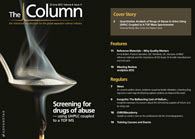Ancient warfare
In 2008 the rostrum from an ancient warship was recovered from the Mediterranean Sea near Sicily.
In 2008 the rostrum from an ancient warship was recovered from the Mediterranean Sea near Sicily. The rostrum was bronze with a wooden core and was used to attack and ram enemy ships in the First Punic War, a conflict between Ancient Rome and Carthage. To establish its origin and condition, samples of black and brown wood were recently extracted and examined using sulphur K-edge X-ray absorption spectroscopy (XAS) and gas chromatography–mass spectrometry (GC–MS).1
GC–MS analysis revealed that the rostrum was constructed from pine, while a derivatized extract of black wood showed that it had been waterproofed with pine pitch. The examination also revealed a large amount of sulphur, about 65% of the endogenous sulphur consisted of thiols and disulphides. Elemental sulphur was approximately 2% and 7% in black and brown wood, respectively, while pyritic sulphur was about 12% and 6%. The presence of sulphur in the wood means that particular care must be taken to preserve the rostrum.
The team concluded that the 2300 years of war, sinking and marine burial followed by decreased oxygen conditions, bacterial colonization, sulphate reduction and mobilization of transition metals had produced pyrite and great sulphur functionality.
1. Eugenio Caponetti et al., Analytical Chemistry, 84(10), 4419–4428 (2012).
This story originally appeared in The Column. Click here to view that issue.
Regulatory Deadlines and Supply Chain Challenges Take Center Stage in Nitrosamine Discussion
April 10th 2025During an LCGC International peer exchange, Aloka Srinivasan, Mayank Bhanti, and Amber Burch discussed the regulatory deadlines and supply chain challenges that come with nitrosamine analysis.












